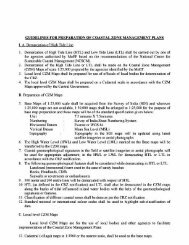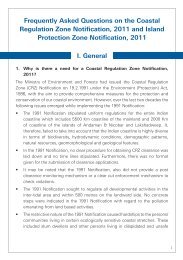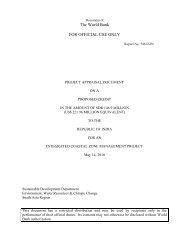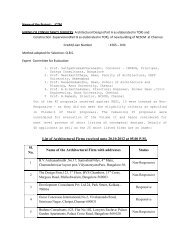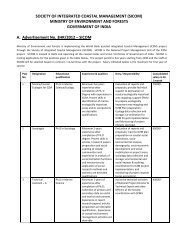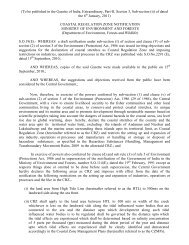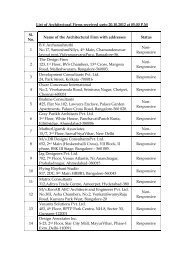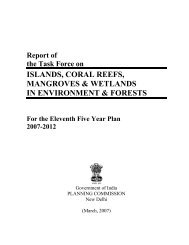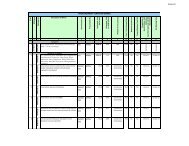NCSCM Building Bid Document - Sicom
NCSCM Building Bid Document - Sicom
NCSCM Building Bid Document - Sicom
You also want an ePaper? Increase the reach of your titles
YUMPU automatically turns print PDFs into web optimized ePapers that Google loves.
to be provided, by the Principal Employer by Law. The Principal Employer is required to take Certificate of<br />
Registration and the Contractor is required to take license from the designated Officer. The Act is applicable to<br />
the establishments or Contractor of Principal Employer if they employ 20 or more contract labour.<br />
f) Minimum Wages Act 1948: The Employer is supposed to pay not less than the Minimum Wages fixed by<br />
appropriate Government as per provisions of the Act if the employment is a scheduled employment.<br />
Construction of <strong>Building</strong>s, Roads, Runways are scheduled employments.<br />
g) Payment of Wages Act 1936: It lays down as to by what date the wages are to be paid, when it will be paid and<br />
what deductions can be made from the wages of the workers.<br />
h) Equal Remuneration Act 1979: The Act provides for payment of equal wages for work of equal nature to Male<br />
and Female workers and for not making discrimination against Female employees in the matters of transfers,<br />
training and promotions etc.<br />
i) Payment of Bonus Act 1965: The Act is applicable to all establishments employing 20 or more employees. The<br />
Act provides for payments of annual bonus subject to a minimum of 8.33% of wages and maximum of 20% of<br />
wages to employees drawing Rs.3500/-per month or less. The bonus to be paid to employees getting Rs.2500/-<br />
per month or above upto Rs.3500/- per month shall be worked out by taking wages as Rs.2500/-per month only.<br />
The Act does not apply to certain establishments. The newly set-up establishments are exempted for five years<br />
in certain circumstances. Some of the State Governments have reduced the employment size from 20 to 10 for<br />
the purpose of applicability of this Act.<br />
j) Industrial Disputes Act 1947: The Act lays down the machinery and procedure for resolution of Industrial<br />
disputes, in what situations a strike or lock-out becomes illegal and what are the requirements for laying off or<br />
retrenching the employees or closing down the establishment.<br />
k) Industrial Employment (Standing Orders) Act 1946: It is applicable to all establishments employing 100 or<br />
more workmen (employment size reduced by some of the States and Central Government to 50). The Act<br />
provides for laying down rules governing the conditions of employment by the Employer on matters provided in<br />
the Act and get the same certified by the designated Authority.<br />
l) Trade Unions Act 1926: The Act lays down the procedure for registration of trade unions of workmen and<br />
employers. The Trade Unions registered under the Act have been given certain immunities from civil and<br />
criminal liabilities.<br />
m) Child Labour (Prohibition & Regulation) Act 1986: The Act prohibits employment of children below 14 years<br />
of age in certain occupations and processes and provides for regulation of employment of children in all other<br />
occupations and processes. Employment of Child Labour is prohibited in <strong>Building</strong> and Construction Industry.<br />
n) Inter-State Migrant workmen’s (Regulation of Employment & Conditions of Service) Act 1979: The Act is<br />
applicable to an establishment which employs 5 or more inter-state migrant workmen through an intermediary<br />
(who has recruited workmen in one state for employment in the establishment situated in another state). The<br />
Inter-State migrant workmen, in an establishment to which this Act becomes applicable, are required to be<br />
provided certain facilities such as housing, medical aid, travelling expenses from home upto the establishment<br />
and back, etc.<br />
o) The <strong>Building</strong> and Other Construction workers (Regulation of Employment and Conditions of Service) Act 1996<br />
and the Cess Act of 1996: All the establishments who carry on any building or other construction work and<br />
employs 10 or more workers are covered under this Act. All such establishments are required to pay cess at the<br />
rate not exceeding 2% of the cost of construction as may be modified by the Government. The Employer of the<br />
establishment is required to provide safety measures at the <strong>Building</strong> or construction work and other welfare<br />
measures, such as Canteens, First-Aid facilities, Ambulance, Housing accommodations for workers near the<br />
work place etc. The Employer to whom the Act applies has to obtain a registration certificate from the<br />
Registering Officer appointed by the Government.<br />
p) Factories Act 1948: The Act lays down the procedure for approval at plans before setting up a factory, health<br />
and safety provisions, welfare provisions, working hours, annual earned leave and rendering information<br />
regarding accidents or dangerous occurrences to designated authorities. It is applicable to premises employing<br />
57<br />
NCB.CW/W-2



